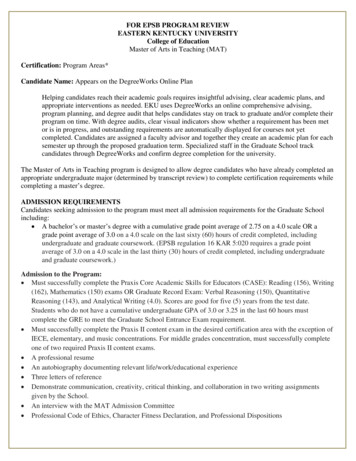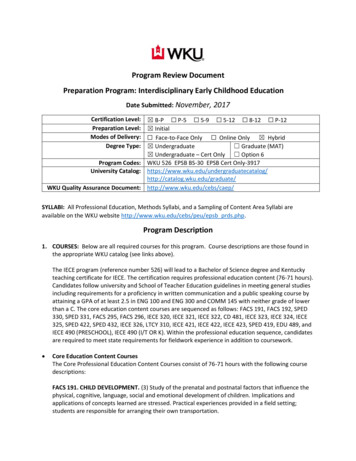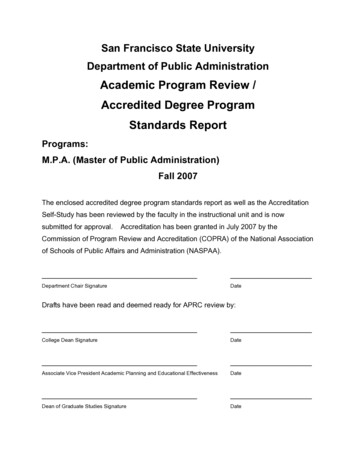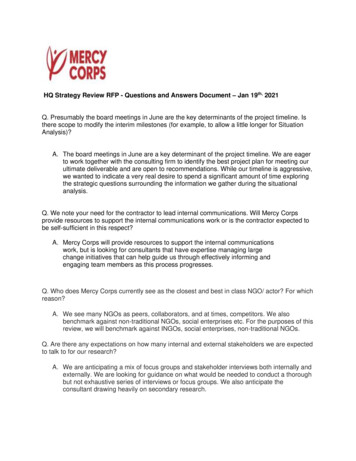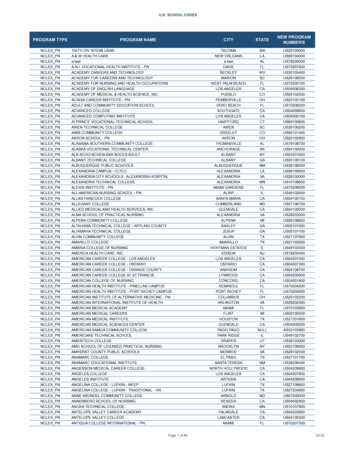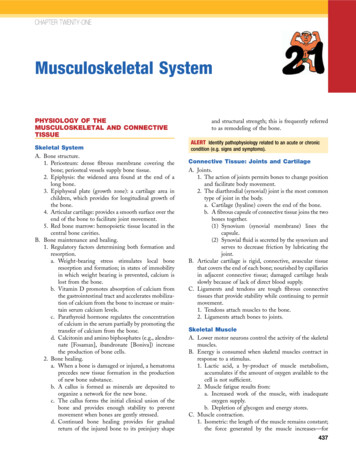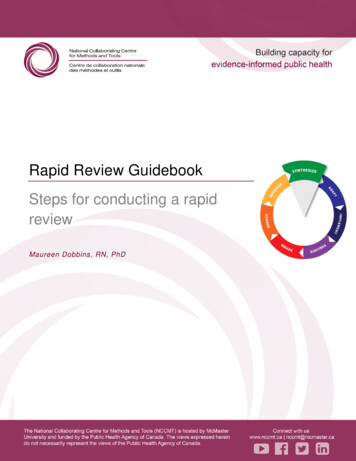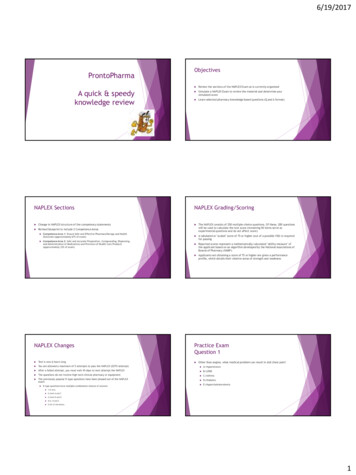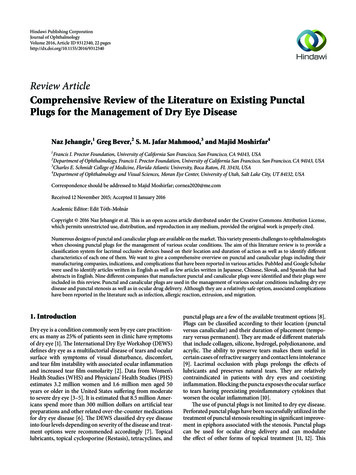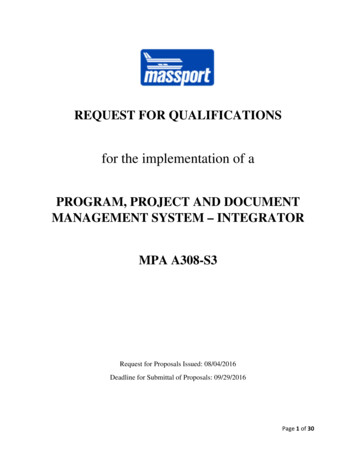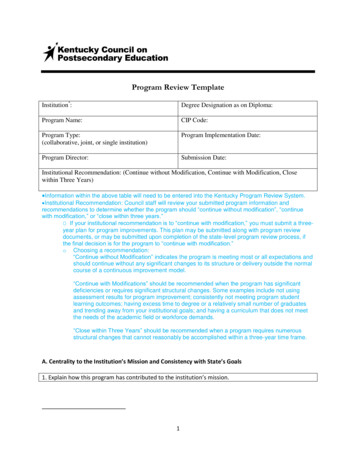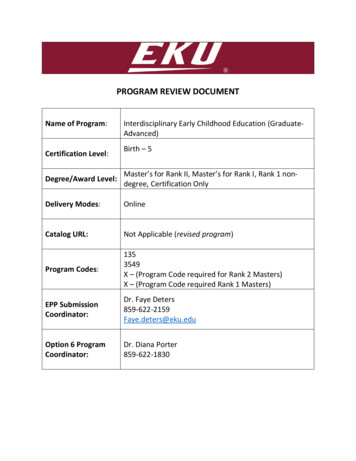
Transcription
PROGRAM REVIEW DOCUMENTName of Program:Certification Level:Interdisciplinary Early Childhood Education (GraduateAdvanced)Birth – 5Degree/Award Level:Master’s for Rank II, Master’s for Rank I, Rank 1 nondegree, Certification OnlyDelivery Modes:OnlineCatalog URL:Not Applicable (revised program)Program Codes:1353549X – (Program Code required for Rank 2 Masters)X – (Program Code required Rank 1 Masters)EPP SubmissionCoordinator:Dr. Faye Deters859-622-2159Faye.deters@eku.eduOption 6 ProgramCoordinator:Dr. Diana Porter859-622-1830
Eastern Kentucky University College of EducationI. Quality AssuranceThe EPP has refined our Quality Assurance System to meet CAEP accreditation standards.The EPP has undergone an annual review process of goal setting, data collection, reviewand analysis of data including annual and three-year trend data (where program admissionnumbers permit), reporting results, and identifying meaningful change for programimprovements for decades. Several years ago, Eastern Kentucky University implemented anAssurance of Learning Day campus wide, which required all programs at the University toengage in this process of analyzing data, reporting results, and determining changes neededto improve candidate performance and achievement. The program reports generatedduring the process described above are aligned to the assessment areas and programreports required by EPSB and the EPP wide reports required by CAEP. Program reportsproduced as a result are reviewed by the University’s Academic Planning and AssessmentCommittee and feedback is provided to the administrator for each program.The data collected by the EPP for the process described above is aligned to the assessmentareas required for annual reporting to EPSB and CAEP. Data collection is overseen by theAssociate Dean for Accreditation, Assessment and Accountability. Data are gathered frommultiple sources external to the EPP including ETS/Title II, EPSB and KCEWS (KentuckyEducation and Workforce Statistics), and EKU’s Institutional Effectiveness Office ofInstitutional Research. Data are also collected internally through the EPP’s Office of StudentSuccess (recruitment and retention), Office of Clinical Placement (placement data, clinicaleducator data, and clinical evaluation surveys), Office of Licensure and Certification(admission, exit, licensure, etcetera), and through EPP created assessments including KeyAssessments (EPP-wide assessments of candidate performance) and program assessments(specific to programs and aligned to the SPA or professional organizations standards guidingthe program). Key Assessment data is collected through the use of TaskStream, which isrequired for candidates in educator preparation programs leading to initial licensure,advanced licensure, or rank change. TaskStream has been used by the College for collectingevaluations of student performance since 2011 with all initial licensure programs across theEPP included, as well as most advanced licensure and rank change programs within thecollege. Additional advanced programs within the College that had collected data usingother mechanisms, began migrating to TaskStream in 2015. Currently, the remaining twoadvanced programs that were housed outside of the College and not utilizing TaskStreamfor student evaluations are in the process of migrating to TaskStream as well.For those EPP wide assessments that are not proprietary, a process for establishingconstruct and content validity and reliability is followed. Each EPP created Key Assessmentis developed by a panel of experts using applicable professional standards with input fromP-12 partners. Then, the EPP utilizes the Lawshe method for ensuring content validity byhaving a panel of experts, including P-12 partners, individually review the assessment anddetermine items on the scoring guide that are viewed as essential for the particularassessment. A content validity ratio (CVR) is established by utilizing a formula (CVR 𝑛𝑒 𝑁/2𝑁/2where ne is the number of experts who mark an item as essential and N is the number of
Eastern Kentucky University College of Educationexperts on the panel) to determine the extent to which experts agree that an item isessential. Items with a CVR score of .80 or higher are considered essential. After a CVR hasbeen established for each item, panel experts discuss each item with a CVR value less than.80 to determine whether the item needs to be deleted or the assessment needs to berevised to clarify the alignment to the item. Then, the assessments are revised andreevaluated using the same approach ensuring that each assessment item retained hasattained a CVR of .80 or higher. This process for establishing content validity is undertakeneach time an assessment is revised.The process of establishing reliability is undertaken each semester, as necessary, to ensurethat all clinical faculty utilizing the assessment to evaluate candidate performance haveinterrater agreement. Initially, all faculty who score a given assessment undergo interrateragreement and calibration training. This process includes each faculty member individuallyutilizing the assessment to score a common candidate work sample. Next, a facilitatorrecords each individual faculty member’s scores on a score sheet without discussion. Avalue of 1 is entered for each item where there is 100% agreement among faculty on thescore (absolute agreement). A value of 0 is entered for each item where faculty scored thesample at different levels (where agreement is not 100%). Then, the faculty engage in adiscussion explaining why each individual scored each item as they did. For any item with aninterrater agreement value of 0, the faculty reach a consensus on what the score should begiven the scoring criteria. Then they establish a “rule” for grading for that item to ensurethat everyone grading that item knows the appropriate score and how to grade on thatitem. The rules are recorded and distributed to each faculty member. Then, the process isrepeated using a new common student work sample until the raters reach a minimum of80% agreement on the assessment ratings for the assessment. To calculate the percentageof agreement, the number of times the raters agree on the same data item is summed anddivided by the total number of data items. Following the interrater agreement andcalibration training, an interrater reliability session is conducted with each assessment. Thisprocess involves having each faculty member who scores the assessment, individually scorea common student work sample. Scores assigned by each faculty member are recorded bythe facilitator and the resulting data is used to establish a reliability coefficient (usingCohen’s Kappa Statistic or other acceptable process determined by researcher) for theassessment. In this way, reliability is established for each assessment.The program reports generated during the process described above are aligned to theassessment areas and program reports required by EPSB and the EPP wide reports requiredby CAEP. The EPP has continued improving and strengthening its processes used forprogram assessment to meet CAEP requirements and standards.Transition points for advanced programs enable monitoring of candidate progress duringprogram completion. For the Interdisciplinary Early Childhood Education (IECE) program,transitions points are as follows.
Eastern Kentucky University College of Education Admission (Entry): All program criteria include: valid teaching certification or statement of eligibilityIn addition, for MAED applicants must meet the University requirement of an overall GPA of3.0 or GPA of 3.25 in last 60 hours of coursework. If not met can take GRE (verbal score of150, qualitative score of 140) or Miller’s Analogy Test (scaled score of 389)and meetrequired scores as listed in catalog.Admission to the Graduate Certification Program in IECE at EKU requires an undergraduatedegree and a KY Provisional – Teaching Certificate in P-5, 5-9, or Secondary for classroomteachers.Reference survey on Candidate Dispositions (which candidate receives from a colleague oradministrator who has worked directly with the candidate): In the areas of Communication,Collaboration, Critical Thinking, and Creativity, the candidate must receive a rating of 3 orhigher to be eligible for admission to advanced programs.Professional Code of Ethics, Character Fitness Declaration, and Professional Dispositionso Candidates must review the Professional Code of Ethics for Kentucky SchoolCertified Personnel established in 16 KAR 1:020 and sign a COE Professional Code ofEthics for Kentucky Declaration form.o Candidates must review the character and fitness questionnaire contained in Section IIIof the CA-1 incorporated by reference in 16 KAR 2:010 and sign a COE ProfessionalCharacter and Fitness Declaration form.o EKU College of Education requires a state criminal history background check approvedby the College of Education as a condition of admission. Under certain circumstances, anational criminal history background check may be required as a condition of admission.o Candidates must demonstrate understanding of professional dispositions expected ofprofessional educators.Practicum (Mid, SED 897) In order to enroll candidates must complete a Practicum Application documentingcompletion of all required coursework. This is verified by program advisors via transcriptaudit.Exit: MAED—completion of action research project. certification—Praxis examII. Program Experiencesa. Program Courses/Experiences –Each individual program includes core content courses designed to provide candidateswith the knowledge they need to teach effectively in the specific discipline and gradelevel for which they are seeking certification or pursuing advanced study. The contentcore for the Interdisciplinary Early Childhood Education program is included in the linked
Eastern Kentucky University College of Educationchart. See Interdisciplinary Early Childhood Education Course Inventory linked e to the chronic shortage of Early Childhood educators in the state Kentucky, thedecision was made to develop an online graduate program to make this certificationaccessible to candidates across the state who would not be able to attend classes on theRichmond campus. The online format allows teachers to earn IECE certification only orin combination with master’s degree while continuing to teach in their communityschools. We also offer a master’s degree non-teaching program for early childhoodeducators who do not need teacher certification. Courses for the graduate IECEprograms were all created for an online format during for the 2015-16 academic year.Each course was developed by a content expert with the support of an instructionaldesigner. All courses contained learning outcomes aligned to all relevant standards andalso met indicators for Quality Matters approval.The planned programs include the admission criteria, required coursework, and exitcriteria including the Praxis Licensure Exam disclaimer. We use the curriculum guides asthe primary method to communicate program details with each student and candidate.Please see linked guides in the program display at http://epsb-caep.eku.edu/epsbprogram-reviews. In addition, the curriculum contract is entered into every candidate’sonline degree audit planner with advising notes (Degree Works). The curriculum guideand the degree audit planner serve as the official communication regarding eachprogram of study. Both are reviewed routinely by faculty and staff advisors.All 100% online programs also have a dedicated Blackboard portal site that containsinformation specific to registration (i.e., course schedule trackers, registration CRNs,semester and term information, etc.). Each student is assigned a faculty advisor and astaff assistant advisor to monitor course progress, help with selection of electives,provide reminders, advise candidates regarding PRAXIS exam requirements, and ensurethat the appropriate paperwork is reviewed and submitted at the correct time forlicensure/certification changes.i. Admission criteria – Admission to the Graduate School A bachelor’s or master’s degree with a cumulative grade point average of 2.75on a 4.0 scale; or a grade point average of 3.0 on a 4.0 scale on the last 30hours of credit completed, including undergraduate and graduatecoursework. (16 KAR 5:020 – Section 1(3)) Additional admission requirements include a Statement of Eligibility orProfessional Certificate with EPSB, and signed Professional Code of Ethicsfor Kentucky Declaration form, COE Professional Character and FitnessDeclaration form, and COE Professional Dispositions reference survey.
Eastern Kentucky University College of Educationii. Clinical/Professional Experiences – All practicum candidates have a Universitysupervisor who works in conjunction with the principals and/or cooperating teachersas applicable at each placement. The cooperating teachers and/or principals areprovided with documents outlining the practicum requirements and expectations. Incases where candidates are not already teaching in the new area of certification,candidates work with their principals to identify classrooms and cooperating teacherswith whom they can fulfill their practicum experiences. Candidates must work withstudent(s) currently identified and being served on an IEP for the disabilitycorresponding to the new area of certification.SED 897 is a semester long clinical experience in which candidates are teaching in thenew area of certification. It requires a minimum of 60 hours of direct contact withstudents with disabilities in the specific area of certification. Requirements aredesigned to ensure an in-depth focus on meeting the needs of diverse learnersthough lesson planning, development and implementation of student growth plans,and ongoing communication with the University supervisor. In addition, cooperatingteachers and/or principals provide feedback to the candidates. Candidates follow theKTIP procedure of submitting a lesson plan and follow-up reflection. The candidateshave two observations from the University supervisor, with ongoing supportivecommunication happening throughout the semester. Observation instruments arealigned with standards and theory frameworks candidates utilize throughout theircoursework.Through the development of a professional growth plan, candidates identify areas forimprovement and enrichment to support learning and development for all students.iii. Exit requirements Program GPA - Candidates must earn an overall GPA of 3.0 or higher, with nograde lower than a C. Successful completion of clinical practicum. MAED adding Certification—successful completion of action research project. Successful completion of Praxis II exam for certificationiv. Kentucky Performance Standards1. Interstate New Teacher Assessment and Support Consortium (InTASC) – Alladvanced teacher preparation programs are aligned to the InTASC standards asindicated in the Program Assessment Charts for each program and programsyllabi for professional, clinical, and content core courses. Syllabi also indicatealignment to the appropriate SPA standards. Program assessments, including thekey assessments that are collected EPP wide, measure performance on indicatorsdirectly aligned to InTASC and CAEP standards. Please see Interdisciplinary EarlyChildhood Education Program Review Assessments linked at http://epsbcaep.eku.edu/epsb-program-reviews.
Eastern Kentucky University College of EducationAll candidates in advanced SED programs seeking additional certification arerequired to complete a practicum experience in the specific area of certificationbeing added. Requirements in this course (SED 897) are designed to ensure an indepth focus on meeting the needs of diverse learners though lesson planning,development and implementation of student growth plans, and ongoingcommunication with the University supervisor. The program assessment in thiscourse (KA5 SED 897) focuses on candidates’ ability to establish a positivelearning environment (InTASC standard 3), to demonstrate instructionalstrategies that are appropriate for content and contribute to student learning(InTASC standard 7), and use a variety of instructional strategies that align withlearning objectives and actively engage students (InTASC standard 8).2. Kentucky Academic Standards (KAS) - Content-focused and pedagogy courses arealigned with both PRAXIS content expectations and Kentucky AcademicStandards. Faculty across the university who prepare our teacher candidateshave also had training related to the Kentucky Academic Standards. From aninstructional point of view, this prepares faculty to embed content and instructionappropriate for developing candidates’ proficiency with those standards.The IECE program assesses content knowledge through GPA and through thePRAXIS exam. In addition, our key assessments require that candidates applyexpectations of InTASC: Content Knowledge. Content knowledge is alsodemonstrated in various contexts and environments: through course levelassessments, in lesson planning and design, and in clinical experiences. Courselevel assessments impact candidates’ GPA, which is one of the measures that theEPP uses to determine programmatic success in this area.3. Kentucky P-12 Curriculum Framework and Kentucky P-12 Assessment System –Candidates use KTIP documents and templates for designing, planning,implementing, and reflecting. They use the KTIP post observation document inthe SED 897 Practicum course. In addition, they utilize the professional growthplan (PGP). Kentucky’s P-12 curriculum framework responds to the understandingthat educators must create a 21st century learning environment that ismotivating, current, and global. Candidates learn and apply new skills andapproaches to their own curricular planning as they further develop their skills toeffectively use data, differentiate instruction to meet every learner’s instructionalneeds, and deliver high quality instruction through research-based practice.Kentucky’s assessment systems also impact candidates’ experience. Throughcoursework in specific certification areas candidates recognize the importance ofunderstanding the potential impact of specific disabilities on studentperformance. Further, they learn to triangulate various sources of data whendeveloping data-informed individual interventions. Candidates analyze pre/postdata to further inform instruction and goal – setting, and they recognize that
Eastern Kentucky University College of Educationassessment is a means to an end, not an end in itself. Candidates gain deeperinsight into the accountability role of assessment as it relates to the entire IEPprocess, including various stakeholders.4. Candidate use of formative and summative assessments – Candidates enrolled inthe MAED degree programs complete an action research project in ETL 806. Thepurpose of this assessment is to determine the candidate’s ability to develop andcomplete a research project by collecting, analyzing, and interpreting data relatedto the impact on student learning. This data- driven decision-making keyassessment focuses on one task that is developed over the course of the programof study. Multiple submissions with instructor feedback are provided to guidecandidates toward successful completion of their project. (See Key Assessment:KA3 ETL 806 Data Driven Decision Making at http://epsb-caep.eku.edu/epsbprogram-reviews. ).v. SPA Alignment – All advanced professional education programs for teachers arealigned to InTASC, ISTE Standards for Teachers, and CAEP. The Interdisciplinary EarlyChildhood Education program is also aligned to CEC Advanced and NAEYC Standards.See Interdisciplinary Early Childhood Education SPA Alignment chart at http://epsbcaep.eku.edu/epsb-program-reviews. This is appropriate!III. Evidence of Field/Clinical PartnershipsCan
Richmond campus. The online format allows teachers to earn IECE certification only or in combination with master’s degree while continuing to teach in their community schools. We also offer a master’s degree non-teaching program for early childhood educators who do not need teacher certification
